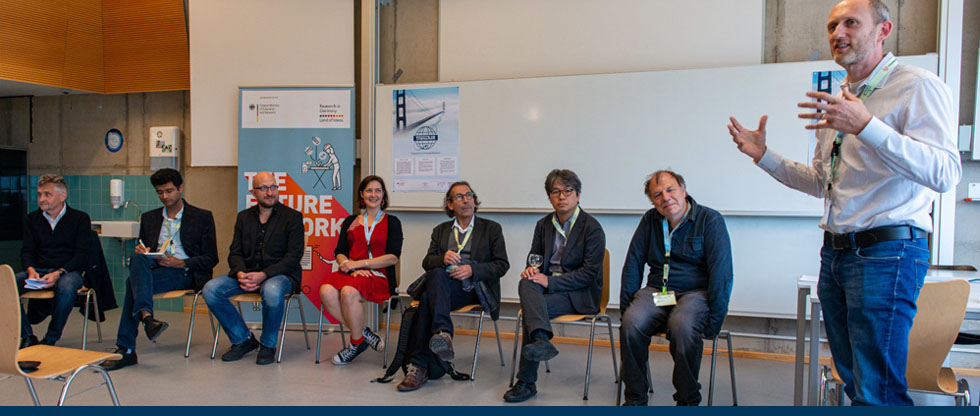



Scientists from the US, Canada, France, Japan, the Netherlands and Germany presented their views of the risks and opportunities surrounding AI and robotics at the EASE Fall School on Sept. 16, 2019. The panel discussion officially kicked off the project TransAIR, which aims to connect a regional network of researchers with scientists in the fields of robotics and AI in the United States. The goal is to cooperate more closely and to develop a better understanding of each other’s approach to the new technologies. The German Ministry of Education and Research funds TransAIR as part of its initiative “The Future of Work.”
The panel’s participants were generally optimistic about AI’s future impact on society. However, they warned of severe problems that need to be prevented through international cooperation as well as local decision-making.
From a sociological perspective, the worst-case scenario would be a massive loss of jobs, emphasized Uwe Engel from the University of Bremen’s Social Science Methods Centre. This could lead to serious instability of the political system. Animesh Garg, Assistant Professor of Computer Science at the University of Toronto, pointed out another potential risk: a lack of fairness if AI is trained in ways that transfer human biases to the computer systems. This could lead to unfair decisions in areas such as recruiting or credit applications. “We need to pay careful attention before this becomes a big problem,” Garg said.
Andreas Wulfes, Head of Data Science at the IT firm Team Neusta, provided a more optimistic outlook from the perspective of an industry representative and private consumer. Developing algorithms for a wide range of products is something he enjoys, he said. So far, AI had made life easier in many regards: “I enjoy a lot of little things like being able to ask Alexa to play certain songs while I’m cooking and don’t have my hands free.” Many older AI applications are not even perceived as such anymore once they become commonplace, he pointed out. Wulfes suggested approaching AI the way society has always dealt with new technologies: Observe it carefully and regulate it when significant issues arise.
Ilaria Tiddi, Research Associate at the Vrije Universiteit Amsterdam, and Rachid Alami, senior scientist at LAAS CNRS (Toulouse), emphasized that it is humanity’s own choice how it is going to use the new tools. “I’m optimistic in the sense that it is up to all of us to make good things happen,” Alami said.
In other parts of the world, the population is already less skeptical: “People in Japan are more optimistic about AI,” said Kei Okada (University of Tokyo). He thinks the attitude is more open because the Japanese society is aging quickly and most people know that they will probably need the help of robots when they get older as there are not enough young people to provide care. In addition, the nation’s economy has benefited significantly from using robots over the last decades.
The head of the special research field EASE at the University of Bremen, Michael Beetz, also expects that robotics and AI will provide essential benefits in areas such as healthcare, natural disasters, and marine industries. However, he is worried because the field is dominated by large corporations that offer solutions in the form of “black boxes” where outsiders don’t know how they work. “Our role as a university is to democratize these technologies by making them accessible for everyone,” he said. Important questions should therefore be tackled in the form of Open Research. This approach would also be a benefit for politics, he expects. “University research is the way politicians can catch up with private companies because it is not done behind closed doors.”
The panel members agreed that solutions to the challenges might be found in increased cooperation between partners from different fields, including joint innovation by universities and industry. In some regards, a global approach will be necessary to maintain a level playing field: “Technology should break down the national barriers,” Animesh Garg said. However, finding an international consensus usually takes a very long time, so most problems will have to be tackled on a local or regional level. Ilaria Tiddi compared it to environmental laws and habits in different parts of the world: “We are moving on the same path but at a different pace.”
The sociologist Uwe Engel warned the AI experts not to stay too focused on the technology alone. “AI needs acceptance in three target areas: users, the general public, and stakeholders,” he emphasized. “Developers would be wise to consider how to gain acceptance in these target audiences already in the development phase. To achieve that, we need a constructive public discussion about the societal and ethical impacts of AI.”